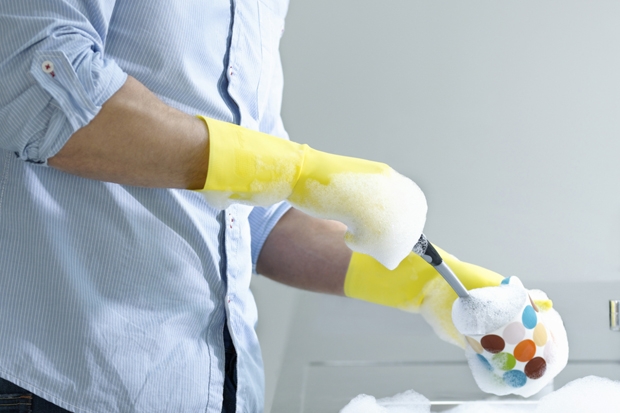After lunch on Christmas Day my father always stood at the sink in his apron and yellow Marigolds and did the washing-up. Rolling up his shirtsleeves the gentleman’s way, as he claimed it was, with two turns maximum to just below the elbow, he couldn’t wait to get started. I can see him now, paper hat, suds up his arms. However, the underlying and perhaps most pressing reason for his doing the washing-up all afternoon was that he was a furtive drinker. When my father courted my mother, he led her to believe that he was a non-smoking, teetotalling Christian believer, when in truth he was the exact opposite of those three ideals; and though a long one, their marriage essentially foundered on the rocks of those discrepancies. Locking himself in the kitchen and doing the washing-up while everyone else opened their presents in the sitting room was the one time in the year he could have a good drink indoors and more or less get away with it. He drank himself to death nearly 20 years ago, in the end quite openly and calmly, but when I think of him today, I always see him in his pinny, and his tie (always that tie) neatly tucked in at the top, accepting another tray of dirty glasses from me with a red face and a fatuous and slightly guilty squint.
Reeling back the years still further, to when I was a child, I also have fond memories of the Boxing Day party that my Auntie Pat and Uncle Eric, relatives on my recidivist father’s side, threw every year. Auntie Pat was a great beauty. She lived with my Uncle Eric in an arrangement that is best described by that educative French phrase ménage à trois, with Marvin, a massively built, small-time card-game enforcer who oozed aplomb and gentlemanly good manners. Everybody loved Marvin, especially we kids. He would tantalise and enthral us by saying things like, ‘We had a right nuisance in the other night. It got so bad that I had to take a claw hammer to the idiot.’ He was once accused (informally) of a gangland shooting at a night club in Epping. ‘Well, I must be a pretty good shot, then,’ he said, ‘because I was in Lewes gaol at the time.’ Marvin was that household’s champion washer-upper, and after supper he would protect his immaculate shirt and tie with an apron and disappear into the kitchen with my father for a two-handed washing-up marathon.
After Boxing Night supper we would clear the decks and play musical chairs and pass the parcel and pin the tail on the donkey and so on. But the traditional favourite was where the company divided into two teams and a bed sheet was held aloft between them and a feather introduced and blown back and forth — to what end I’ve forgotten. The great thing about the blowing-the-feather game, however, was that all the women and children and some of the men would shriek with excitement. Every year an attractive, self-contained masseuse friend of Auntie Pat’s came to the party, and although we didn’t know what a masseuse was or did, our child’s intuition told us that she was the quietest, kindest and wisest person in the room and that she was also a bit sad. She was a terrific feather blower, though. And one of Auntie Pat’s aunts would at some point in the evening get out her small glass square and ink it with a roller and take palm prints from us all, I think because she had a gift for telling useful things about a person’s future life and health from these prints. We kids cared little about the future, but we did exult in having our palms smeared with sticky black ink by an apparently responsible and serious-faced adult.
Finally Marvin and my father would emerge from the kitchen as a double act to take the applause. And because he had had a good soak while he was out there, my father might speak to me affably, which was something he didn’t often do when he was sober. One year, I remember, he smiled at me and said, ‘Forgive us our Christmases as we forgive those who Christmas against us’, which is not an easy thing to articulate sober let alone drunk. Then, I probably looked at him with priggish, childlike disdain. But now that I am nearly as old as he was when he died, I sort of get it. And so may I take this opportunity to wish you all a peaceful and joyful Christmas and to pass on my father’s Boxing Day prayer to each and every one of you: Forgive us our Christmases as we forgive those who Christmas against us.







Comments